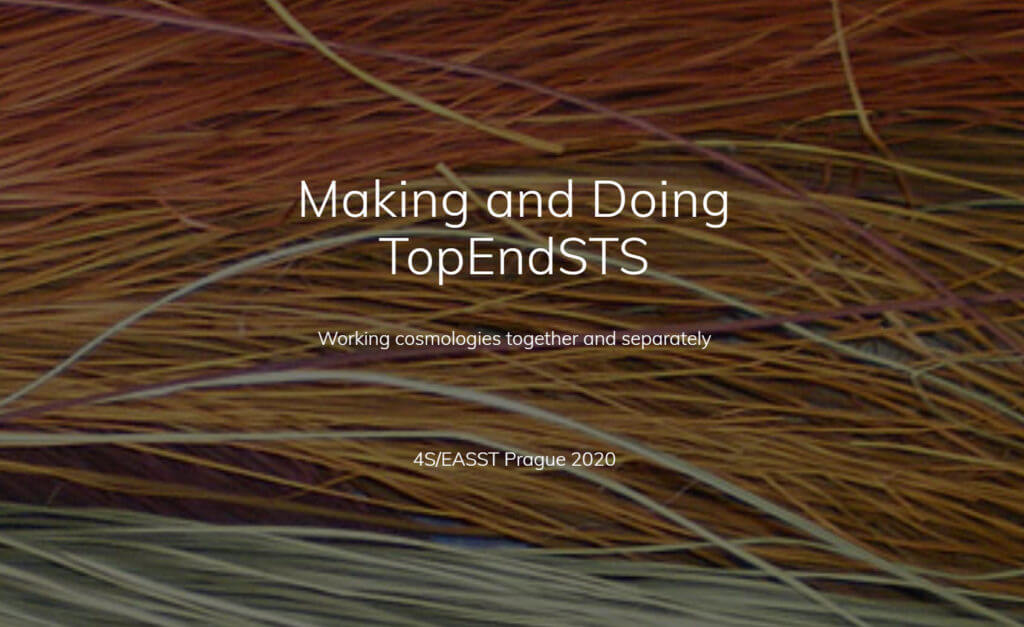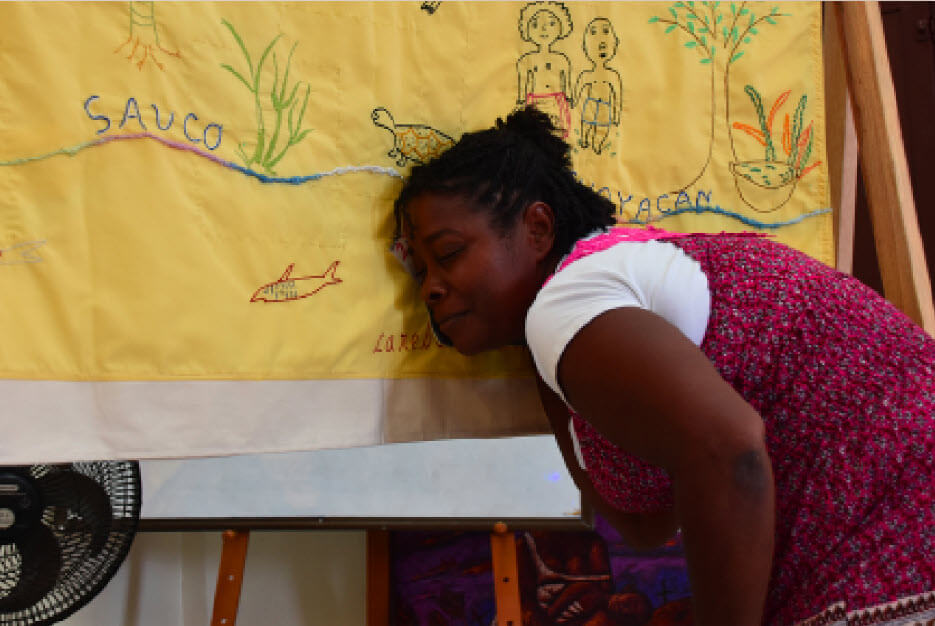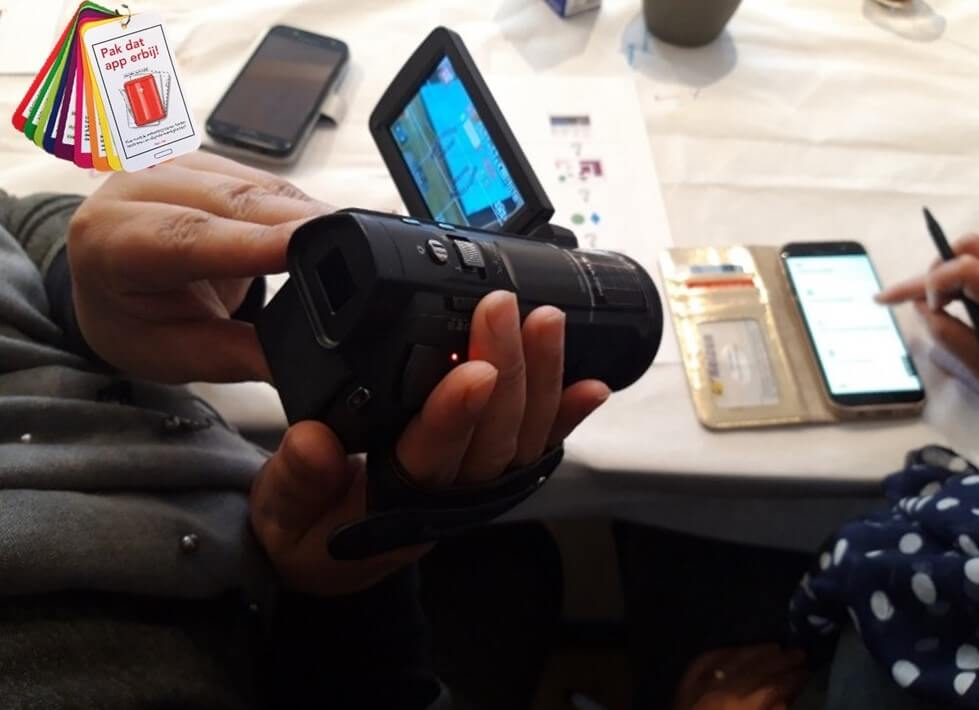STS Making and Doing Awards 2020: (multiple winners)
The STS Making & Doing Awards committee, faced the challenging task of selecting three STS Making & Doing awards from the wonderfully vibrant contributions that were presented during the virPrague 4S/EASST Making & Doing program that ran over three days (curated by a team led by Ludek Broz (Czech Academy of Sciences)). The committee consisted of Geof Bowker (UC Irvine, US), Lucas Becerra (Universidad National de Quilmes, Argentina), Dawn Nafus (University of Otago, New Zealand and Intel Labs, US) Paula Juarez (Universidad National de Quilmes, Argentina) Amanda Windle (Independent researcher, UK, Council member, Committee co-chair) and Teun Zuiderent-Jerak (Vrije Universiteit Amsterdam, NL, Council member, Committee co-chair). To be sensitive to any conflicts of interest, if a member who serves on the committee is part of a submission, then that committee member does not participate in the evaluation of that project, nor in the deliberation of the awarding decision (i.e. leaves the meeting).
The following three projects, that are equally exceptional in their own ways, have been selected for the STS Making & Doing awards 2020.
Making and Doing TopEndSTS – on country and online?
By: Michaela Spencer, Charles Darwin University; Cathy Bow, Charles Darwin University; Yasunori Hayashi, Charles Darwin University; Leonie Norrington, Charles Darwin University; Simon West, Charles Darwin University; Jennifer Macdonald, Charles Darwin University
For an incredibly rich long-term initiative on indigenous knowledge, that deeply works through what it means to do knowings together and that entwines technologies of representation and people in intellectually profound ways.
Embroidering the Times of Listening: Testimonial Digital Textiles for Reconciliation in Colombia
By: Jaime Patarroyo (Universidad de Los Andes), Nasif Rincón (Universidad de Los Andes), Camila Padilla (Universidad de Los Andes), Laura Cortés-Rico (Universidad Militar Nueva Granada), Tania Pérez-Bustos (National University of Colombia)
For making visible and audible the ways in which textile craft work enacts processes of reconciliation in which the focus is not on making voices heard, but on the work of listening to embroidered speakers that interweave hi- and lo-tech and lets people feel and hear the texture and voices of the women involved.
Learning While Doing: Vlogs About Digital Inequality
By: Nicole Sylvia Goedhart (Athena Institute, VU University, Amsterdam), Teun Zuiderent-Jerak (Athena Institute, VU Amsterdam), Christine Dedding (Metamedica, Amsterdam UMC-location VUmc), Jacqueline E.W. Broerse (Athena Institute, VU Amsterdam)
For working with materialities and developing capabilities oriented to the resolution of interrelated social problems: digital, gender and income inequalities. The doing is in the making with others.
2020 Making and Doing Program
View the entire 2020 Making and Doing Summaries here.
Procedures
The STS Making and Doing initiative aims at encouraging 4S members to share scholarly practices of participation, engagement, and intervention in their fields of study. It highlights scholarly practices for producing and expressing STS knowledge and expertise that extend beyond the academic paper or book. By increasing the extent to which 4S members learn from one another about practices they have developed and enacted, the initiative seeks to improve the effectiveness and influence of STS scholarship beyond the field and/or to expand the modes of STS knowledge production.
The STS Making and Doing Awards formally acknowledge and celebrate distinctive achievements in practices of STS making and doing. It recognizes 4S members who have demonstrated scholarly excellence in formulating, enacting, and sharing theoretically-informed practices of participation, engagement, and intervention in their fields of study.
The STS Making and Doing program is organized as part of the 4S annual meeting. Selected presentations will be displayed at an exhibition during the meeting.
STS projects to be considered include but are not limited to the following categories:
- Policy: STS projects that resulted in policy papers, recommendations, regulations, devices, decision-making practices, or other policy outcomes. Policy arenas include medicine and health, development, infrastructures, and communication in addition to those explicitly oriented to science and technology.
- Design and Planning: STS projects that resulted in the design and creation of effective products, graphics, spaces, and landscapes. The outcomes can be large or small in scale, and can be digital in content. Projects can be organized around different design themes, .e.g. participatory design, sustainable design, etc. The presentation should show explanation of design process and how various actors are involved in the process.
- Arts: STS projects that resulted in effective artistic creations, including those in audio-visual format or in public installations, exhibits, and performances. The presentation should be accompanied by a narrative that links the project to STS scholarship.
- Pedagogy: STS projects that resulted in effective practices for education and training. The project can aim at different levels and forms of education and training, for instance university courses, high school classes, or special training programs. The presentation should indicate how the project increases awareness and understanding of STS scholarship.
- STS infrastructures: STS projects that resulted in effective informational or material infrastructures for the construction, operation, and travel of STS as field or discipline. Such might include the building of degree programs, modes of print and electronic publication, professional organizations, summer schools, institutes, scholarly collectives, and the 4S annual meeting itself. The presentation should move beyond promotion to include reflective analysis.
- Open Category: Any project that reflects the objectives of STS Making and Doing, including civic engagement, social activism, public debate and festivals, etc.
Submission
In addition to paper and session submissions, the 4S invites proposed presentations as part of the Call for Papers for the STS Making and Doing Session for the 2018 meeting in Sydney.
Criteria for Selection
A subcommittee of the Scientific Committee will review submissions. The subcommittee will assess the project in terms of four main criteria:
- Issue of concern: Does the issue fit one or more areas of STS knowledge and expertise?
- Critical thinking and creativity: Does the project enact critical analysis and contribute to the production and expression of STS knowledge and expertise in creative ways?
- Conceptual Development: Does the project further the intellectual development of STS concepts and theories?
- Consequences and Responses: Do the presenters show how their project’s outcomes extend STS knowledge and expertise into the targeted arena? Do the project’s outcomes draw knowledge and expertise from the targeted arena?
Online Preview
Selected presenters will prepare materials for a web-based exhibition prior to the 4S meeting. This online preview will allow both subcommittee members and meeting participants to browse the concepts and exhibit materials prior to the 4S meeting. After the 4S meeting, presenters will be invited to update their presentation for a permanent web-based exhibit.
Presentation
The award includes a cash prize to help defray the costs of attending the annual meeting to receive it. The program chair will reserve a block of time for STS Making and Doing presentations. The event will be organized as an STS fair exhibit in which selected submissions are displayed in the conference venue. Participants may choose the presentation format as appropriate, constrained by the space occupied by a table. Presentation modes may include inter alia product samples, models and prototypes, mechanical/digital demonstrations, slide shows, and other installations. Each presentation will be given an A3-sized sheet for meeting attendees to write comments.
Evaluation
The evaluation process will be carried out through qualitative assessment on each contribution. It takes crowd-sourced assessment from meeting attendees as a starting point. Attendees will be encouraged to make comments on each of the presentations as appropriate. Comments can be submitted electronically via the STS Making and Doing website for which they can use their mobile devices. Additionally, computer stations will be set up in the venue to facilitate attendees in making comments. Free wifi connection will be available on site for those using their own device to make comments. In addition to online comments, attendees are able to make comments manually on an A3-size sheet provided in each presentation booth. The committee will evaluate each presentation by applying the criteria listed above and taking into account comments on the presentation. Drawing on suggested criteria from crowd-sourced evaluation, the committee will stipulate three winners for different categories to be awarded the prizes.



